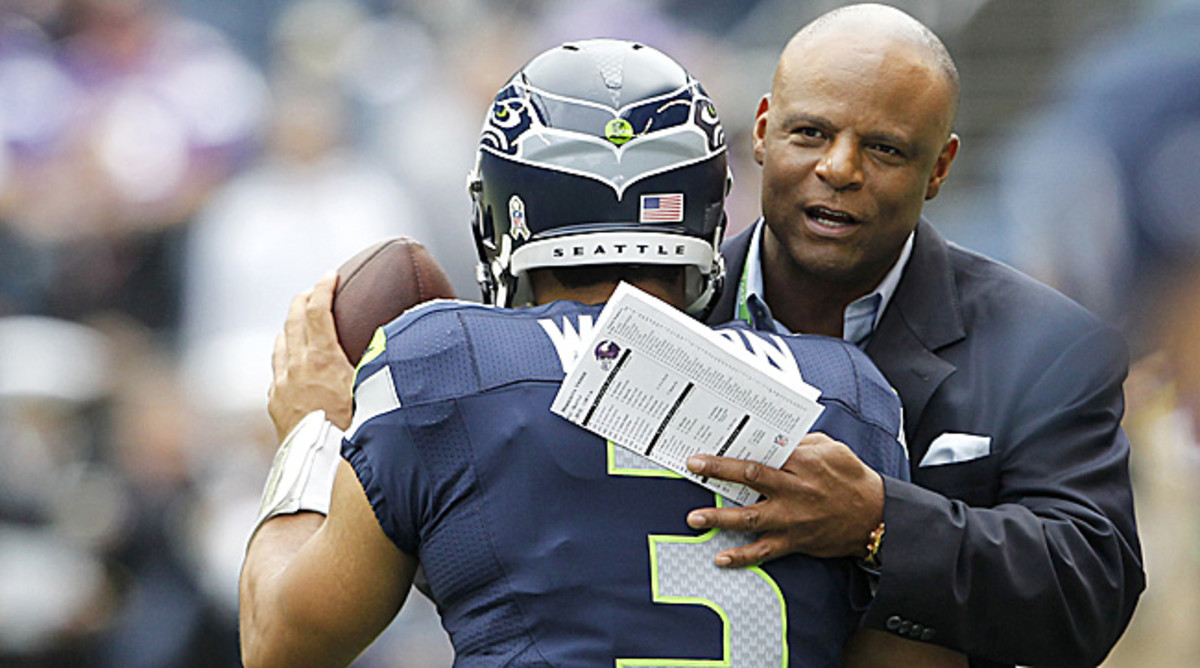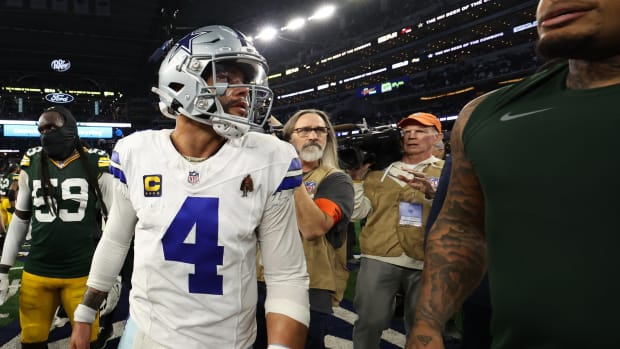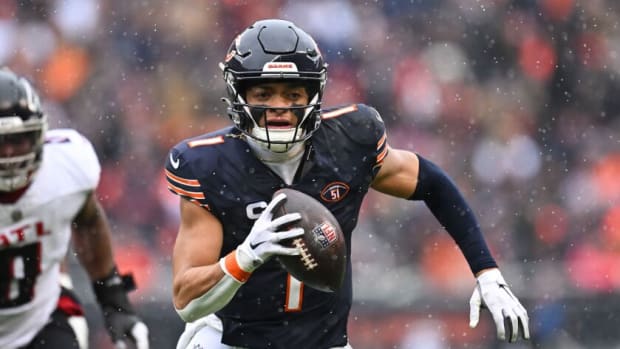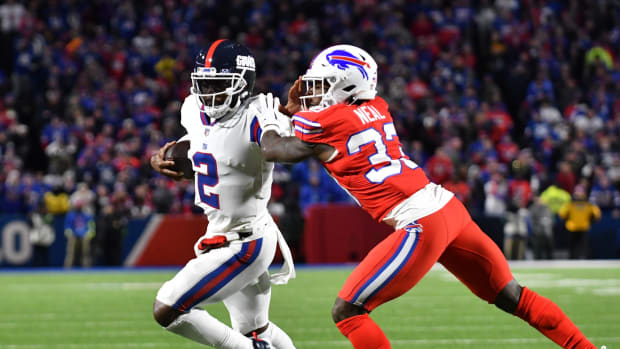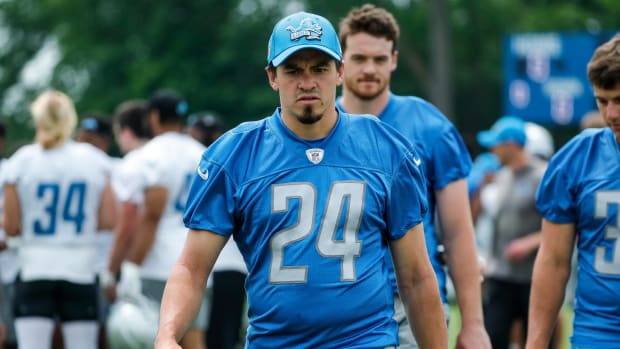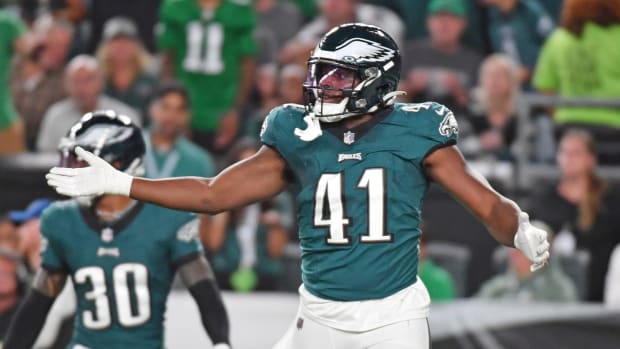What Russell Wilson Wants
As he nears a self-imposed Friday deadline for a new contract, Russell Wilson isn’t lacking unofficial advisers.
He’s described in league circles as a networking savant, and his fast-growing phonebook is filled with contact info for dozens of business moguls, celebrities, former players and gurus. Peek into his luxury box at Seahawks games and you might see a YouTube co-founder or the creator of HBO’s Entourage, and there’s no telling how many millionaires Wilson counts as mentors.
But at least one of them has earned the quarterback’s ear in recent years, and he’s closer to the game than most of Wilson’s buddies. Warren Moon was able to stump Wilson three weeks ago when dishing advice on his current contract negotiations with the team. “You know what you want,” the Hall of Fame quarterback told Wilson over the phone, “but what will you end up taking? What’s the least you’ll accept?” Wilson didn’t have an answer.
Moon understands Wilson’s motivations because in certain ways they mirror his own when he entered the NFL in 1984. Spurned in the 1978 draft (all 12 rounds), Moon and agent Leigh Steinberg believed his race was a deterrent. He signed a long-term deal with the CFL’s Edmonton Eskimos and won five Grey Cups in six seasons, then declined a homecoming with the Seahawks (Moon played at the University of Washington) to join the Houston Oilers, who offered—wait for it—more guaranteed money.
“He’s a really strong and mature guy, very spiritual, but he’s human also,” says Moon, who last communicated with Wilson about contract talks three days ago. “I had to deal with doubt because of my color, he has to deal with it because of his size. He feels like he’s being disrespected because of that.”
Wilson, who is 5-11, was a third-round pick out of Wisconsin in 2012, downgraded in part due to his stature. Since then, he has won a Super Bowl, been to two, completed more than 63% of his passes and sits just shy of 10,000 passing yards over three seasons, a total his critics often point to as evidence of his relatively light impact on a team built around defense and a power running game. For comparison, of the 12 quarterbacks who started all 48 games over the last three seasons, Wilson is the only one who didn’t reach the 10,000-yard plateau.
Contrast that popular criticism with Wilson’s reported desire to earn about $25 million per year with landmark guarantees that would make him the league’s highest-paid quarterback, and you might understand Seattle’s reticence to commit. Yet Wilson, according to Moon, is taking the long view, keeping in mind the likelihood that new contracts for Aaron Rodgers, Eli Manning, Philip Rivers and Andrew Luck would come on the heels of any Wilson deal. Wilson, Moon says, is trying to preemptively keep up with the Joneses, not set a long-term benchmark for passer contracts.
“Given what he’s done since he got here, he deserves to be paid like one of the top five to seven quarterbacks in the league because that’s about where he is, in terms of skillset, production and success,” Moon says. “I don’t think Russell necessarily wants to be the highest paid in the league; he understands where the QB market is going.
“If Russell was able to get $22 million right now, there are going to be four or five guys who leapfrog him. He just wants to stay in suit with the guys at the top. He doesn’t want to sign a deal that becomes obsolete.”
But what Wilson really wants more than league-leading yearly compensation is piles of guaranteed money. He has played the last three seasons for just over $2.1 million, per the CBA-negotiated rookie wage pool. Ever the politician, Wilson’s comments have hinted at the notion that he’s owed something for past sacrifices while promising no lapse in work ethic regardless of outcome.
“Whether I'm fortunate enough to receive a lot of money for a lot of hard-earned work or I'm still working for it every day,” Wilson said recently, “I'm never going to change in that aspect of it all.”
In the 26-year-old’s thinking, he gave up a promising baseball career to play quarterback in a scheme that assigns more risk to the passer than any in the NFL (Wilson’s 1,877 rushing yards over the past three seasons is the most among quarterbacks), and his reward ought to reflect that.
“The organization can use the argument that he’s not asked to throw as much as other quarterbacks because it’s true,” Moon says, “but he is asked to run the ball more than other quarterbacks, which could possibly shorten his career. He gets there differently, but he’s just as productive as these other guys.”

While he's yet to miss a game, Seattle's offense puts Wilson at greater risk than the average quarterback. (Jonathan Ferrey/Getty Images)
Aside from the material arguments about Wilson’s impact and worth, there’s the personal side of the negotiations. There’s pride at stake here: No Super Bowl winning quarterback has ever played under the franchise tag, which Wilson could very well face if negotiations fall through this offseason and the next.
Common sense lends to the notion Wilson and agent Mark Rodgers will come to an agreement before Friday rather than see Wilson play for $1.5 million in 2015. As former Seahawks coach Mike Holmgren noted last week, “To not sign it, and to play this year for [$1.5 million]. They always run the risk of injury. If he asks me, I’ll tell him. And that’s why I think he’s making a mistake.” In either case, whether he takes a deal or not, Seattle runs the risk of irreparably damaging a relationship with a star player, despite what the congenial quarterback will say in the press this month as training camp begins.
“These contract negotiations can really bitter and sour a player,” Moon says. “It really affects the way they play, prepare, and those relationships in the organization.
“He’s saying all the right things, but what are you going to think about every time you see that coach and that GM and that owner. It takes away from your dedication to the organization. You don’t want to see that at the quarterback position. You want that guy to be all in.”
There’s one more thing to consider. Wilson's feelings will be moot if a contract hinders Seattle's ability to assemble the kind of roster that has helped Wilson thrive over his first three seasons. So even if we do see some resolution in the next 24 hours, the final verdict is years away.
































